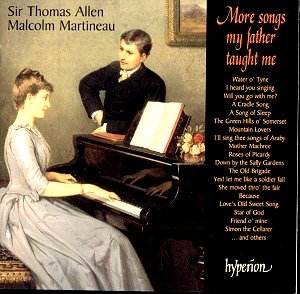They used to say –
perhaps they still do – that the sign
of a misspent youth was the deathly
pallor induced by hours of badly lit
hours in the snooker hall. But there’s
another kind of furtive pleasure, the
kind one enjoys with a mixture of shame
and quiet pride, and it’s a pleasure
licensed by history. It’s called collecting
78s of ballad singing. Sad ballads,
bad salads, I’ve heard all the jokes
and maybe one or two more. When collectors
nestle deep into their wallets and surface
with chequebook and card as payment
for a unique offering of some Moscow
contralto on a 1903 Russian G &
T, I pass by without a blush. For me
it’s Hubert Eisdell and Harold Williams,
Malcolm McEachern and John McCormack,
Richard Crooks and Tudor Davies. And
dozens more, each name a master of the
ballad art, as well as many arts of
course. Which makes this latest offering
from Allen and Martineau, their second
in this series, an enticing prospect.
These songs simply aren’t sung much
now and it’s a delight to hear them
sung again and so sympathetically.
The composers’ and
lyricists’ names vary in familiarity.
Of the composers there’s Eric Coates,
W.H. Squire and Haydn Wood from the
great days of British string playing
composers, there’s Guy d’Hardelot (née
Helen Guy), ballad songsmith in excelsis
and one of three women composers represented.
There’s a descendant of the Sterndale
Bennett, there’s an aristocrat, a couple
of Herbert Hughes arrangements of Irishry
and some American influence in the form,
inter alia, of Carrie Jacobs-Bond whose
A Perfect Day is one of the canonical
transatlantic contributions to the genre.
In fact the selection is wide and handsome.
So, some highlights. W.H. Squire’s Mountain
Lovers is splendidly done – softened
articulation in the second verse, a
typically strong and forthright ending
as well. I think manly is the mot
juste – typical of Squire at his
most jaw-jutting. Odoardo Barri – crazy
name, crazy guy as a satirical magazine
would doubtless put it – wrote The
Old Brigade to lyrics by Fred Weatherley
who wrote, most famously, for Coates.
It’s an Empire Stirrer all right but
a sensitive one and Allen summons up
spectral military ghosts with gravity
and sensitivity. Allen and Martineau
are splendid in a song I’ve not heard
sung in years, Molloy’s Love’s Old
Sweet Song and they are affecting
in Wilfred Sanderson’s Friend o’
mine. They do all they can for Lord
Henry Somerset’s A Song of Sleep.
Its effect on me was all too literal
I’m afraid though his Lordship redeems
himself with a rather attractive setting
of Christina Rossetti’s poem Echo.
Allen does piety as
well as he does parlour. The pulpit
is in one’s mind’s eye in Coates’s Star
of God. Truth to tell though Coates
evoked hedge and ale better than the
Almighty and this is no buried masterpiece.
Allen’s taste for salt spray and brine
is certainly engaged by the Empire Nauticalia
of Sanderson’s Time To Go: really
stirring stuff. His strong commitment
and darkening baritone serve up a steady
arsenal of winners. Where he misses
the mark it’s a question of degree and
taste, also perhaps ultimately the limitations
of a baritone voice in some quintessentially
tenorial areas. So I’d have liked a
shade more rubato in I Heard You
Singing and whilst there’s a deliciously
aware example of his portamento in The
Green Hills o’ Somerset I’d have
liked even more. He can’t match Tudor
Davies’ declamatory Yes! Let me like
a soldier fall. This is a song much
recorded by inter-War tenors, most prominently
Heddle Nash and Walter Widdop. But when
Davies sang it, by God, you believed
it. Sir Thomas is altogether a more
pacific chap, more cardigan than bloodstained
tunic. D’Hardelot’s Because is
also not quite there. It’s difficult
to put one’s finger on it but it has
something to do with effulgent generosity
and simplicity. Simon the Cellarer
wants more of a wink perhaps – in
avoiding the vulgar or obvious gesture
perhaps Sir Thomas also loses some of
the infectious brio of it all. Try as
he might McCormack stubbornly refused
to vacate my brain in the songs most
associated with him. When he sings of
the fair Irish maid why does Sir Thomas
sing ca-lleen not co-lleen
in The Star of the County Down?
McCormack didn’t. Never mind. Sullivan’s
Orpheus with his Lute, one of
the art-song settings here, is a fine
interpretation of a most superior setting
and the unaccompanied songs that begin
and end the disc are especially touching
and expressive.
The documentation is
really typical Hyperion: extensive,
elegant, and well laid out with texts
and descriptive historical biographies.
The sound is to me rather spread. It
gives a breadth to the voice and Martineau’s
highly impressive accompaniments but
there’s a loss of acoustic focus. If
you have the first volume you’ll need
to add this. To those who have a yen
to hear again Roses of Picardy and
Just a–wearyin’ for you here’s
your perfect opportunity.
Jonathan Woolf
See review
of Volume 1
